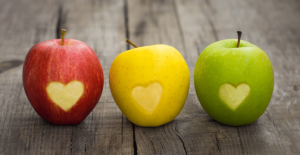
With so many of us worried about the spread of coronavirus, it is normal to seek ways to protect ourselves. In particular, maintaining a healthy diet is more important now than ever in order to support normal functioning of the immune system. It is also critical to dispel myths and misconceptions. You may have noticed news articles, blog and social media posts boasting ‘immunity-boosting’ remedies such as drinking hot lemon water or eating garlic to help combat the virus. Unfortunately, when it comes to the role of nutrition in relation to the immune system, the solution is not so simple. No single miracle food, drink or dietary supplement can prevent infectious viruses such as coronavirus. This is because, as the name suggests, the immune system is not a single entity, but a complex network of biological functions and therefore a number of different nutrients are involved in its normal functioning.
10 micronutrients that play different roles in the immune system
Vitamin A: Plays an important role in supporting the cells that help identify infections. Think colourful: vitamin A can be found in dark green leafy vegetables and orange-coloured fruits and vegetables such as carrots, sweet potatoes and cantaloupe
Vitamin B6: Helps produce new immune cells, process antibodies and allows immune cells to communicate. It’s found in poultry and fish, fortified breakfast cereals, egg yolk, soya beans, sesame seeds and some fruit and vegetables, like banana, avocado and green pepper.
Vitamin B12: Helps produce new immune cells. It is found in animal products like meat, fish, milk, cheese and eggs, as well as fortified breakfast cereals.
Vitamin C: You probably know about vitamin C’s connection to the immune system, but did you know you can get it from much more than just citrus fruits? Leafy green vegetables such as spinach and kale, peppers, brussel sprouts, tomatoes and strawberries are also excellent sources. Vitamin C helps immune cells attack pathogens, enables us to clear away old immune cells from the site of infection, and also helps maintain the skin- our external barrier to infection.
Copper: Helps protect and fuel immune cells. It can be found in bread, wholegrain breakfast cereals, rice, quinoa, meat, fish and shellfish, pulses, avocado, dried fruit, nuts and seeds.
Vitamin D: Vitamin D deficiency is associated with reduced immune response. Our main source of vitamin D is from sunlight on our skin but food sources include oily fish, eggs and fortified cereals. As it is often difficult to get enough vitamin D from the diet, a supplement of 10 micrograms a day during the colder months, or all year round if we aren’t often outdoors is often advised. This is something many of us may need to consider if mainly staying at home and particularly when self-isolating. Speak to you doctor for further advice on this.
Folate: Helps produce new immune cells. It can be found in green vegetables and pulses as well as fortified foods including whole grain products
Iron: Help maintain the health of immune cells. Iron comes in different forms: your body can more easily absorb ‘heme iron’, which is abundant in lean poultry such as chicken and turkey, plus seafood. Vegetarians can get ‘non-heme’ iron from beans, broccoli and kale.
Selenium: This nutrient is vital for producing new immune cells and can help to strengthen response to infection. It’s found in nuts and seeds, particularly Brazil nuts, cashews and sunflower seeds, as well as eggs, fish and shellfish.
Zinc: Found in a wide range of sources from meat and poultry, to cheese and wholegrains, zinc helps produce new immune cells, helps develops ‘natural killer cells’ that help to fight off viruses, and supports communication between immune cells.
Each stage of the body’s immune response relies on the presence of many micronutrients, demonstrating the importance of a balanced and varied diet for maintaining a healthy immune system.
How to build a balanced diet
Eating a good quality diet, as depicted by the Eat Well Plate, can prevent deficiencies in key nutrients. A balanced diet is generally one that contains the following:
- Wholegrain starchy and fibrous carbohydrates
- Lean forms of protein in the form of meat, oily fish, eggs and plant-based options such as beans, pulses, nuts, etc.
- Lots of fruit and vegetables
- Moderate amounts of dairy and fortified plant-based dairy alternatives
- Small amounts of unsaturated fats such as olive oil
Do supplements help?
While it may be tempting to stock up on supplements, it’s best to get your vitamins and minerals from your food rather than in pill form. There is some evidence on the effects of Vitamin C and Zinc on the common cold, however this is a different virus to COVID-19 and it is unknown whether supplements would have any benefit to protect against coronavirus. There are certain populations and situations in which one cannot always eat a variety of nutritious foods, or who have increased nutrient needs. In these cases a vitamin and mineral supplement may help to fill nutritional gaps.
Much still remains to be known about the influence of nutrition and dietary intake on COVID-19. If you are concerned that your diet does not provide all the nutrients you need, it is important that you seek advice from a dietitian or other healthcare professional and follow the current advice set out by the Government, NHS and Public Health England.





Share your thoughts...